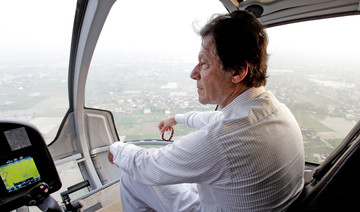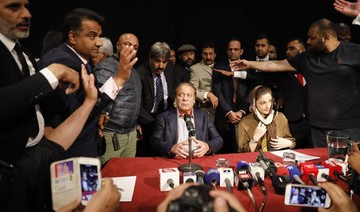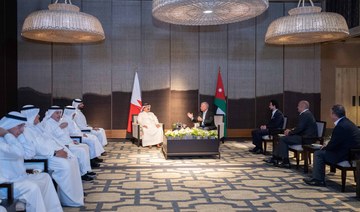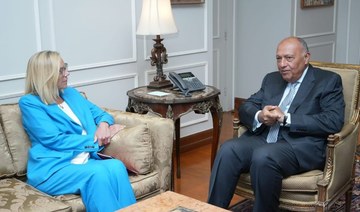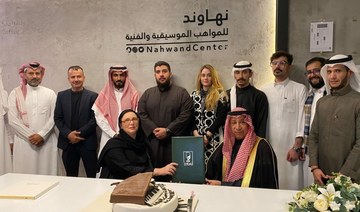LAHORE: Ousted Pakistani Prime Minister Nawaz Sharif and his daughter Maryam were arrested on Friday after flying back to the country to face lengthy prison sentences, in a high-stakes gamble to galvanize their beleaguered party ahead of a July 25 election.
Uniformed men escorted the Sharifs, who were sentenced in absentia on corruption charges last week, from their airplane after it touched down in the central city of Lahore at around 8:45 p.m. (1645 GMT), a Reuters reporter on board said.
A spokesman for Sharif’s Pakistan Muslim League-Nawaz (PML-N) party confirmed they were arrested soon afterwards. Local Geo TV said Sharif and his daughter were taken to another waiting aircraft to be flown out of Lahore, where more than 10,000 Sharif supporters were gathered to greet him.
Their return could shake up an election race marred by accusations Pakistan’s powerful military is working behind the scenes to skew the contest in favor of ex-cricket hero Imran Khan, who describes Sharif as a “criminal” who deserves no support.
Clashes broke out Friday evening at the main highway entry point to Lahore between pro-Sharif protesters and police who had been deployed in their thousands, a Reuters witness said. There were no immediate reports of injuries.
Mobile phone service had been cut off in mid-afternoon, as Sharif’s brother, Shehbaz, led around 10,000 party supporters on a march toward the city center in defiance of a citywide ban on public gatherings, according to a Reuters witness.
Nawaz Sharif decried the tactics ordered by the caretaker government that took over in June ahead of the general election, as Pakistan’s constitution requires.
“What credibility will these elections have when the government is taking such a drastic action against our people and this crackdown is taking place all over the country?” he told Reuters at the airport in Abu Dhabi as he waited for a connecting flight to Lahore.
Pakistan’s third major political movement, the Pakistan Peoples Party, joined the criticism of the crackdown, with its prime ministerial candidate Bilawal Bhutto Zardari questioning why Sharif’s supporters would be prevented from gathering.
“Why is Lahore under siege? Right to peaceful protest is fundamental for democracy,” tweeted Bhutto Zardari, the son of two-time prime minister Benazir Bhutto, who was assassinated at a political rally in 2007.
The country’s media regulator warned local news channels to abstain from airing statements “by political leadership containing defamatory and derogatory content targeting various state institutions specifically judiciary and armed forces,” the regulator said in a statement.
Adding to the tension surrounding the upcoming poll, a suicide bomber hit an election rally of a regional party in southwestern Pakistan, killing 85 people. The bombing was the biggest attack in Pakistan in more than a year and the third incident of election-related violence this week.
Ousted Pakistani PM Sharif arrested after flying home to face jail
Ousted Pakistani PM Sharif arrested after flying home to face jail
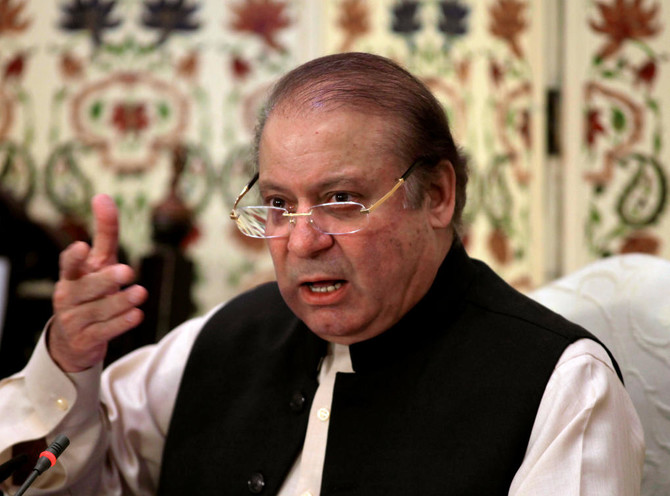
US says Pakistan’s prosperity and security remains a ‘top priority’
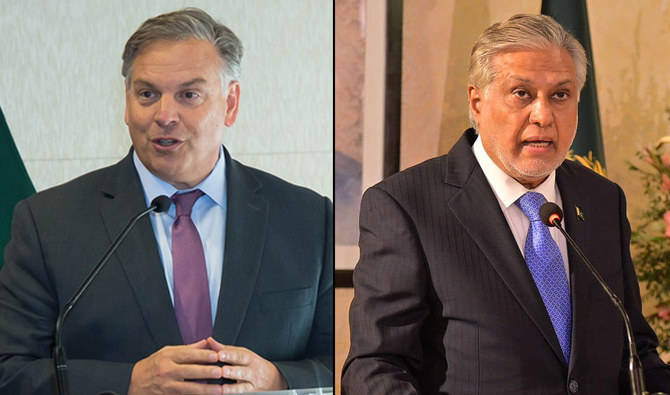
- Blome’s comments come amid a spike in militant attacks in Pakistan
- Pakistani finance chief has launched negotiations for a new IMF bailout
ISLAMABAD: US Ambassador Donald Blome met Pakistani Foreign Minister Ishaq Dar on Thursday and said the South Asian nation’s prosperity and security remained a ‘top priority’ for Washington.
Blome’s comments come amid a spike in militant attacks in Pakistan and while its finance chief is in discussions with the International Monetary Fund in Washington on a potential follow-up program to its nine-month, $3 billion stand-by arrangement.
“US Ambassador Donald Blome met today with Foreign Minister Ishaq Dar to discuss recent events in the region,” Acting US Mission Spokesperson Thomas Montgomery said.
“Ambassador Blome conveyed the United States’ commitment to working with the government and people of Pakistan, underscoring that prosperity and security for Pakistan remains a top priority for the United States.”
Pakistan went to the polls on February 8 in a vote marred by a mobile Internet shutdown on election day, arrests and violence in its build-up and unusually delayed results, leading to accusations that the vote was rigged.
However, the US has repeatedly said it will work with the new government of Prime Minister Shehbaz Sharif, though it has expressed concerns about reported election irregularities and urged a probe.
Although defense and key foreign policy decisions are largely influenced by Pakistan’s powerful military, Sharif will have to juggle relations with the US and China.
Islamabad has close economic ties to both the nations, which has put it in a tricky position as the two countries have embarked upon a costly trade war.
“From our perspective it has to be an and-and discussion,” finance minister Muhammad Aurangzeb said in an interview this week when asked how the Sharif government plans to conduct its trading relationships with the world’s two largest economies.
“US is our largest trading partner, and it has always supported us, always helped us in terms of the investments,” he said. “So that is always going to be a very, very critical relationship for Pakistan.”
“On the other side, a lot of investment, especially in infrastructure, came through CPEC,” he said, referring to the roughly 1,860-mile-long China-Pakistan Economic Corridor designed to give China access to the Arabian Sea.
Aurangzeb said there was a “very good opportunity” for Pakistan to play a similar role in the trade war as countries like Vietnam, which has been able to dramatically boost its exports to the US following the imposition of tariffs on some Chinese goods.
“We have already a few examples of that already working,” he said. “But what we need to do is to really scale it up.”
Militancy has also spiked in recent months, creating a major challenge for the new government, with religiously motivated groups like the Pakistani Taliban as well as ethnic separatists showing an enhanced ability to hit high-value targets.
In an attack last month that has so far been unclaimed, a suicide bomber rammed a vehicle into a convoy of Chinese engineers working on a hydropower project at Dasu in the northwestern Khyber Pakhtunkhwa province, killing five Chinese nationals and their Pakistani driver.
The Mar. 26 assault was the third major attack in little over a week on China’s interests in the South Asian nation, where Beijing has invested more than $65 billion in infrastructure projects as part of its wider Belt and Road initiative.
ACWA Power, IRENA join hands to accelerate global renewable energy transition
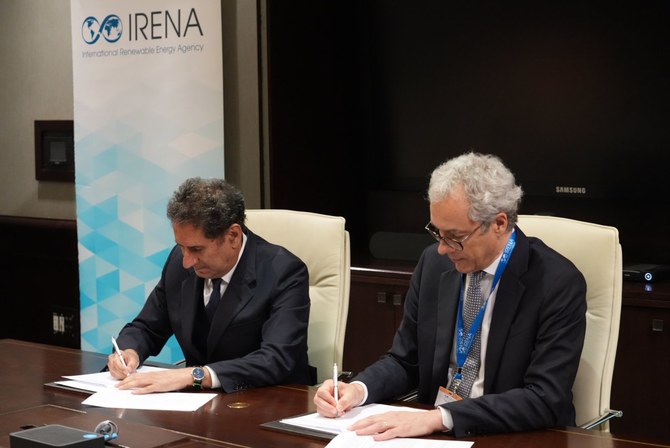
RIYADH: In a bid to add impetus to the adoption of clean energy sources worldwide, Saudi utility firm ACWA Power has signed a deal with the International Renewable Energy Agency, said a press release issued on Thursday.
The Saudi-listed firm said that the partnership aligns with its mission to provide sustainable energy solutions and seeks to accelerate the adoption and sustainable use of renewable energy across the globe.
ACWA Power will work closely with IRENA to share crucial insights on infrastructure investment in renewable energy, green hydrogen advancement, solar energy, smart grids, and the intersection of energy and water, the press release said.
The Saudi-listed company also announced its participation in various IRENA initiatives, such as Green Hydrogen, Collaborative Frameworks, Project Facilitation, the Alliance for Industry Decarbonization, the Utilities for Net-Zero Alliance, and the Coalition for Action.
As per the deal, ACWA Power and IRENA will investigate avenues to mobilize finance and investment for renewable energy projects, while also supporting infrastructure for the development, storage, distribution, transmission, and consumption of renewables.
Moreover, collaborative workshops and seminars will be arranged to exchange best practices, enhance skills, and promote awareness of the energy transition among youth, professionals, and the public using IRENA’s platforms and programs.
ACWA Power CEO Marco Arcelli said the partnership with IRENA marks a significant milestone in his company’s journey toward a sustainable energy future.
“By combining our strengths and resources, we are prepared to drive meaningful change and accelerate the transition to renewable energy on a global scale,” he said.
The CEO added that through collaborative partnerships and innovative solutions, ACWA Power remains committed to advancing the widespread adoption and sustainable use of renewable energy, shaping a brighter and more sustainable future for generations to come.
IRENA Director General Francesco La Camera commented: “We have less than a decade left to secure a fighting chance for a 1.5°C world. Accelerating the renewable-based energy transition needs industry leaders and this deal between IRENA and ACWA Power stands for the growing commitment of global industry to act on decarbonization.”
He added: “We need to act together to accelerate the sustainable use of renewables and green hydrogen across the globe.”
King of Bahrain, Egyptian president highlight need for unified Arab response to Gaza crisis
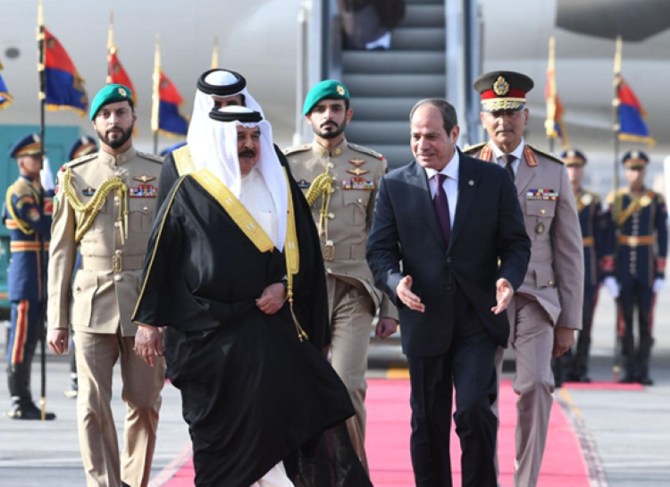
- Abdel Fattah El-Sisi and King Hamad pledge joint action to address the escalating crisis in Gaza
- King Hamad and El-Sisi also discussed the agenda for the 33rd Arab Summit, which Bahrain will host next month
CAIRO: Egyptian President Abdel Fattah El-Sisi and King Hamad of Bahrain have pledged joint action to address the escalating crisis in Gaza and its effects on the region.
El-Sisi received King Hamad in Cairo on Wednesday, where the leaders expressed hope that peace efforts would lead to a new path for the region, offering a future in which they work together toward prosperity.
King Hamad told a joint press conference that the president and he also discussed the agenda for the 33rd Arab Summit, which Bahrain will host next month.
The leaders emphasized the need for clear policies to promote peace, security and stability in the Middle East.
The king said he discussed several issues with El-Sisi to enhance Arab cooperation.
El-Sisi said he and King Hamad deliberated “on our countries’ efforts and joint Arab action to address this untenable situation, bring it to an end, and, above all, prevent its recurrence.”
The Egyptian leader added: “For this to happen, the international community shall stand united to enforce an immediate, urgent, and lasting ceasefire in the Gaza Strip, end any attempts of coerced displacement, starvation, or collective punishment of the brotherly Palestinian people, and ensure the full-fledged, unfettered and sustainable flow of sufficient quantities of desperately needed humanitarian aid and relief to the sector.
“In parallel, the parties shall immediately embark, in earnest, on tracks conducive to a just and enduring political solution to the Palestinian cause, based on the two-state solution and the establishment of an independent, sovereign Palestinian state, along the June 4, 1967 borders, with East Jerusalem as its capital, enjoying both international acknowledgment and full membership of the UN.”
El-Sisi said Egypt had repeatedly warned of the dire consequences likely to result from the ongoing war in occupied Palestine, where the conflict leads to calls for escalation and retribution, creating a cycle of violence that destroys any chance for peace and stability in the region.
“Indeed, over the past few months, the region has been experiencing the devastating consequences of the ongoing war as its flames spiraled outward, creating the current intensely fraught and perilous state in the region that gravely jeopardizes the security, stability, and future of our people,” he added.
El-Sisi said that the leaders “thoroughly discussed these troubling regional developments and our visions for addressing them, driven by our shared belief in the crucial importance of safeguarding the security and stability of the region and its peoples against multiple threats and of not abandoning their fate to the will of warmongers. This commitment is grounded in the principle of prioritizing common Arab security, which we consider as indivisible.”
El-Sisi said that the two leaders agreed on the need to exert and encourage immediate and intensive efforts toward de-escalation in the Palestinian territories and at regional level.
“We also discussed the importance of urging the parties to adopt a rational approach, embrace political solutions, and abandon military solutions and notions of dominance and hegemony,” the president said.
El-Sisi said: “Today, we are gathering at a time of great peril as a result of the bloody Israeli war on the Gaza Strip and the inexorable loss of thousands of helpless and innocent civilians in scenes of untold horror.
“They have done nothing more than live in their land, clinging to their homes and homeland, and yearning for a life with dignity, pride, and humanity.
“It is unequivocally a watershed moment that will endure in the annals of history, given the outrageous use of military force to terrorize, starve, and inflict unimaginable suffering on innocent civilians, collectively and indiscriminately, to terrify them into abandoning their homes and forcibly displace them from their land.
“All this unfolds while the international community stands by idly, with its ability or will to uphold justice and enforce international law, international humanitarian law, or even the basic tenets of humanity, utterly crippled,” El-Sisi said.
Central bank chief briefs foreign investors on ‘substantial improvement’ in Pakistan’s macroeconomic outlook

- Ahmad is accompanying Finance Minister Muhammad Aurangzeb to IMF and World Bank spring meetings in Washington
- Meets investors during multiple events organized by leading financial firms, including JP Morgan, Citibank and Jefferies
ISLAMABAD: State Bank Governor Jameel Ahmad on Thursday met key international investors in the United States capital, Washington DC, and informed them about “substantial improvement” in Pakistan’s macroeconomic outlook in the last year.
Ahmad is accompanying Finance Minister Muhammad Aurangzeb to IMF and World Bank spring meetings in Washington, where he met investors during multiple events organized by leading global banks and financial firms, including JP Morgan, Citibank and Jefferies.
While in DC, the Pakistan team will also be starting negotiations for a new three-year multi-billion-dollar bailout deal from the IMF.
“Governor SBP informed the participants about the substantial improvement in Pakistan’s macroeconomic outlook achieved over the past year as a result of a prudent monetary policy, backed adequately by fiscal consolidation and beginning of the implementation of key structural reforms,” a statement from the Pakistani economic affairs division said.
Inflation declined sharply in Pakistan, reaching a two-year low of 20.7 percent in March 2024 from a peak of 38 percent in May 2023.
“Deceleration in inflation is broad-based, reflecting the combined impact of monetary tightening, fiscal consolidation, ease in import supplies, improved agriculture output and base effect,” Ahmad told investors.
“More importantly, core inflation declined markedly, reaching 15.7 percent in March, after persistently staying above 20 percent throughout last year.”
He also said the external sector had stabilized, as reflected in a sharp reduction in the current account deficit (CAD) to $1 billion during Jul-Feb FY24 from $3.8 billion in the same period last year.
In addition to stabilization policies, improved agriculture output had contributed to higher food exports, while lowering the import demand of agri commodities like wheat and cotton.
Workers’ remittances had also risen consistently since October 2023 on a year-on-year basis, driven by incentives and regulatory measures to divert inflows toward formal channels.
“These qualitative improvements in the external account have allowed the SBP to more than double its FX reserves from January 2023 ($3.1 billion) to around $8 billion on 12 April 2024 despite the repayment of a $1 billion Eurobond on the same day. At the same time, the SBP’s forward liabilities have also reduced significantly from $5.7billion in January 2023 to $ 3.4billion in February 2024.”
Ahmad also spoke about the improvement in the country’s external debt dynamics, with a reduction in the gross financing requirements due to sizable CAD contraction. Moreover, the maturity profile of external debt had also improved, with the share of relatively costly short-term commercial loans declining while the share of long term concessional financing from multilateral agencies, coupled with support from bilateral partners, which was rising.
“Ahmad also noted a recent pickup in inflows from overseas Pakistanis via Roshan Digital Accounts and also by other foreign investors, on the back of strong performance in achieving the targets and benchmarks under the IMF SBA program,” the statement said.
“Going forward, the government is hopeful of signing a long term IMF program, which will facilitate additional external financing and the adoption of structural reforms to deal with longstanding issues in the economy.”
The governor also highlighted SBP’s efforts to provide a conducive macroeconomic environment for the private sector to invest in the economy.
The SBP’s Strategic Plan 2028 aims to facilitate growth by achieving price and financial stability.
“In this regard, Mr. Ahmad highlighted the widespread adoption of digital technologies to address gaps in access to financial services and to revolutionize the domestic payments system,” the economic affairs division said. “These time-bound reforms are expected to put the economy on the path of sustainable economic growth.”
Governor of Taif meets with Saudi cultural director
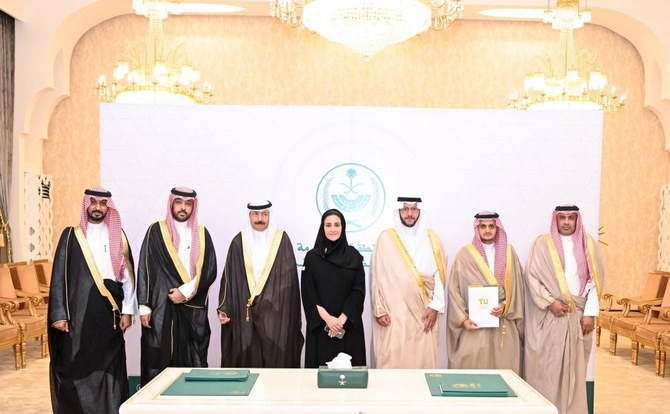
- Prince Saud bin Nahar was briefed on SASCA’s strategy and initiatives aimed at fostering and empowering talent in the cultural and artistic fields
- A cooperation agreement was signed between SASCA and Taif University
RIYADH: Governor of Taif Prince Saud bin Nahar bin Saud met Princess Haifa bint Abdulmohsen, the director of development and partnerships at the Saudi Arabian Society for Culture and Arts, at the governorate’s headquarters on Thursday.
The governor was briefed on SASCA’s strategy and initiatives aimed at fostering and empowering talent in the cultural and artistic fields, in line with the objectives of the Kingdom’s Vision 2030.
The parties were also present at the signing of a cooperation agreement between SASCA in Taif and Taif University.



